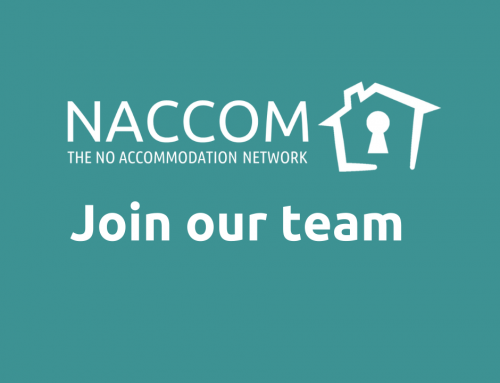Here is a update from Justin Koame, Chair Person at NICRAS, the Northern Ireland Community of Refugees & Asylum Seekers, which became a NACCOM Member earlier this year.
How does NICRAS work?
‘NICRAS was established in 2002 by the Northern Ireland Council for Ethnic Minorities (NICEM), and became an independent organisation in 2007. It is a membership-based charity, and the management committee is elected at the AGM and is composed of asylum seekers, refugees and advisors with expert knowledge of policy and charities. There are now around 600 members from 32 different countries around the globe.
In 2015 NICRAS organised a comprehensive strategic planning day consultation. It found that members wanted NICRAS to focus not only on providing support, but also on empowering members, seeking recognition for their skills and experiences, and opportunities to integrate and participate in community life.’
What services do you provide?
‘As an advice and support service, NICRAS does not directly provide accommodation, although we are in consultation with other organisations such as Refugee Welcome, about establishing an emergency accommodation service based on a network of hosts able to provide accommodation on a short term basis.
The organisation is frequently involved in helping refugees and asylum seekers with accommodation issues. This can include advocating on their behalf with landlords, hostels, the Northern Ireland Housing Executive, and asylum accommodation contractors, on issues such as living conditions, repairs, points allocation, eviction and any other problem. We also advise asylum seekers and refugees who have become destitute or homeless by signposting them to other services and providing food.
We are currently conducting research on both enforced homelessness among refugees and asylum seekers, and the conditions of the accommodation provided as National Asylum Support Service (NASS) housing.’
What are the biggest challenges you’re facing at the moment?
‘As an organisation, the biggest challenge we are currently facing is finding the resources to increase our capacity, as the increase in the number of asylum seekers and refugees in Northern Ireland has increased the demands for our services. We have only one full time employed member of staff, an advice and support worker. The rest of our work relies on volunteers. We have found that the demand on our advice and support services has increased. The attendance at our free English language classes has also increased, and often the classes have more attendees than is optimum for learning.
Another challenge is the demand for services that we do not generally have the resources to provide, such as emergency financial support. Accommodation for homeless refugees and asylum seekers with no recourse to public funds is one of these areas, hence our efforts to try and establish a solution.’
Can you give any highlights over the last few months?
‘One of our achievements of which we are very proud was successfully campaigning the Northern Irish Minister of the Department of Employment and Learning, Dr Stephen Farry, to extend free English for Speakers of Other Languages (ESOL) classes to all refugees. Previously these classes had only been free for asylum seekers and for those Syrians being relocated here as part of the Vulnerable Persons Relocation Scheme. Since February 2016 they have been free for all.
In March we published a report on the causes and impact of destitution among refugees, which was launched at an event attended by several members of the Stormont Assembly. This report was the result of a long period of research and work, and included concrete recommendations for the relevant government agencies on how enforced destitution could be prevented, which we are going to follow up.’
To access this report please visit our Resources page.




